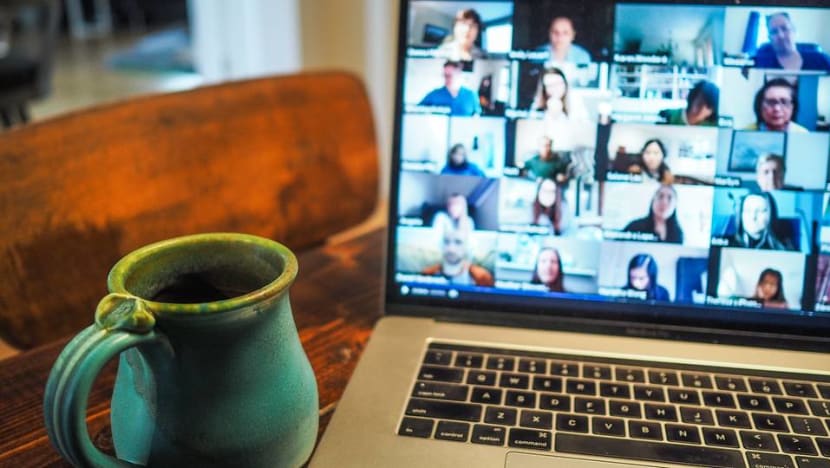commentary Commentary
Commentary: Do you really want to work from home forever like some Twitter employees can?
What are some ways to figure out if remote working permanently is for you? Forest Wolf’s Crystal Lim-Lange and Gregor Lim-Lange give their take.

Students on internships had to make an effort to communicate with colleagues online. (Photo: Unsplash/Chris Montgomery)
SINGAPORE: Twitter announced last week they will allow some staff to work from home (WFH) forever. No doubt killing the risk of a coronavirus spread in the office was a key reason behind the move.
Still, the public reaction has been really strange. People have been asking for WFH forever but now we’ve actually tried it, that idealised dream of WFH is looking less like the object of our desire.
The reality is that we’ve woken up from the fantasy of being able to do anything anytime anywhere.
We are also realising the office had some pretty amazing perks, and WFH comes with a whole host of hidden costs and challenges.
At the same time, now that we have had a taste of the new possibility of flexible work, most of us want the power to choose where and how we work, less so the sole option of WFH permanently.
READ: Commentary: The surprising things you learn working from home with your other half
READ: Commentary: Mothers working from home on Instagram look stylish, serene and nothing like my reality
WORKPLACES CAN BE GOOD FOR MENTAL HEALTH AND COLLABORATION
Research shows being able to go to an office may be good for our mental health and well-being.
We are social creatures. Being around others – whether collaborating, sharing a meal, or simply having a watercooler chat – provides us with a sense of belonging, connecting and being understood, and directly buffers against the stresses of work and life.
Having a dedicated workplace also allows for clearer boundaries between work space and home space, and can help individuals manage their workloads better and prevent burn-out.
READ: Commentary: COVID-19 will reshape the Singapore office property market outlook

“After working from home for nearly two months, I really miss the office, manufacturing floor and discussions with colleagues in corridors and the canteen … There is nothing like being in a meeting room together with a physical flip chart to get all the great ideas together and come out with a solution together,” Rajnish Narula, Director of Business Excellence at Pfizer
The happenstance element of bumping into people and having random conversations is also a boon for creativity and innovation.
“Somehow a Zoom meeting doesn’t quite cut it. I have gotten stories for my newsletters just by serendipitous pantry conversations,” Eleanor Tan, Global Head, Corporate Communications at The China Navigation Company tells me.
READ: Commentary: This circuit breaker is making us yearn for human interaction more
READ: Commentary: Lockdown and isolation sound simple – but keeping people at home is no easy answer
WORKPLACE ARE GOOD FOR ATTRACTING AND DEVELOPING TALENT
The best workplaces play a crucial role in attracting and retaining talent.
In our experience running the career centre at the National University of Singapore, one of us often came across students exchanging notes on the look and feel of the offices they interviewed at, with some of the brightest turning down job offers because they couldn’t imagine themselves locked in “McCubicles”.
On the other hand, when you walk into a thoughtful office – say the lobby of the Economic Development Board for example, where you see a giant electronic display with real-time trade routes, the stunning views over the city and the intimate discussion areas scattered everywhere, you immediately and intuitively understand that this is a place where bright minds gather to solve problems in innovative ways.
Inspiring organisations also celebrate learning and have multi-functional spaces for developing talent – vital when constant reskilling and training is the new norm. We know people learn best when they learn together.
WE WANT DIVERSITY AND CHOICE
Perhaps it’s not about either working in the office or at home but having all options.

In a survey we carried out with more than 170 people across diverse occupations, only 17 per cent said they wanted to work from home primarily. The vast majority wanted the ability to choose.
“People have always wanted diversity and choice in their workplace experience. Even before COVID-19 hit, ‘work’ had left the building and social media had entered, creating a disruption in people’s expectations and a desire for new forms of leadership and social engagement at work,” Tamagin Blake-Smith, principal at Hassell, an architecture, design and urban planning practice told us.
Technology has enabled us to work anywhere. Working from home is really just one option. People want to work in the train, in the park, in coffee shops and coworking spaces.
READ: Commentary: COVID-19 has stripped work to bare bones - was all that excess needed anyway?
READ: Commentary: How Zoom-working will change companies forever
Having a flexible employer open to WFH signifies trust, support and provides agency. Workers may ultimately choose not to use the option to WFH. But when they feel safe, listened to and engaged, they are motivated to work harder.
THE UNDERLYING MOTIVATION FOR WFH
Perhaps the way to look at this is to ask yourself why WFH is important to you. Do you want to WFH because you are attracted to the advantages, for instance, because you are more productive when you have control over your hours, or find your home office more suitable for your type of work?
Or do you want to WFH because you want to get away from someone or avoid something at the office – like annoying colleagues, critical bosses or giving presentations?
The ultimate avoidance is choosing to work from home because you don’t quite feel engaged in your role yet haven’t gotten the courage to change jobs or take steps to fix the underlying issue.

DOES WORK FROM HOME WORK FOR YOU?
The litmus test whether working from home is suitable for you, is whether it makes you more engaged with your work or less.
There is no one-size-fits all answer. We all have different communication styles and drivers of motivation. WFH is not necessarily a good fit for everyone.
But here is a quick and dirty psychology-based checklist of questions we have put together to help you assess your suitability:
- Mental health: Are you at risk for depression or prone to anxiety or loneliness? Social support is an important factor in staying mentally well, especially if you have a history of mental health issues.
- Self-motivation: Are you (and do others describe you as) self-motivated, structured and disciplined? Do you have a history of setting good routines for yourself, for instance, have you always had a consistent bedtime or exercise routine?
- Distractability: How good are you at managing distractions at home whether they are external (kids, the draw of the fridge or Netflix) or internal (distracting thoughts or anxiety)? Research on attention has shown that about half the time, we are not focused on what we do in the present moment.
- Boundaries: Can you put in place time and space boundaries to contain your work so that you avoid burnout? How separate is your work space from your relaxation space? Can you stick to set work hours and go offline after work or do your work thoughts creep into every waking hour of the day when you’re working from home?
- Home relationships: Are you capable of being present and off duty with the people around you so that you still maintain strong relationships as a spouse, parent and family member?
- Communications: Are your communication skills up to the task? WFH requires sophisticated communication skills, both written and verbal. Without cues like subtle facial expressions, body language and tone of voice, messages can get lost in translation or misinterpreted.
- Support from bosses: For WFH to work, there must be a baseline of genuine trust between employer and employees. Employees need to feel safe, supported and assured their performance is based on output rather than hours spent sitting at a desk. Employees also need to be good at asking for help because WFH may make it difficult for bosses to get a sense of what support people need.
OPPORTUNITY TO INCREASE GENUINE ENGAGEMENT
COVID19 has forced companies to rethink the importance of working arrangements and employee welfare.

Never before have we seen so many companies introduce measures to prevent burnout, perhaps inspired by leading brands such as Google and Johnson & Johnson announcing days off for employees to combat work from home stress.
Our hope is this pandemic provokes companies to take a more human-centric approach towards work, and value employee engagement and well-being as much as profits.
What is clear is that employees want three things – flexibility, the feeling of trust from their employer, and for work to become outcomes-based rather than output-based.
The smart employers will understand the psychology of employee engagement and move fast to give talent what it wants.
LISTEN: Disruption 101: How COVID-19 is revolutionising work
BOOKMARK THIS: Our comprehensive coverage of the coronavirus outbreak and its developments
Download our app or subscribe to our Telegram channel for the latest updates on the COVID-19 outbreak: https://cna.asia/telegram
Human Capital expert Crystal Lim-Lange and clinical psychologist Dr. Gregor Lim-Lange are the authors of Deep Human- Practical Superskills for a Future of Success and the co-founders of Forest Wolf, a leadership training and talent development consultancy.

















